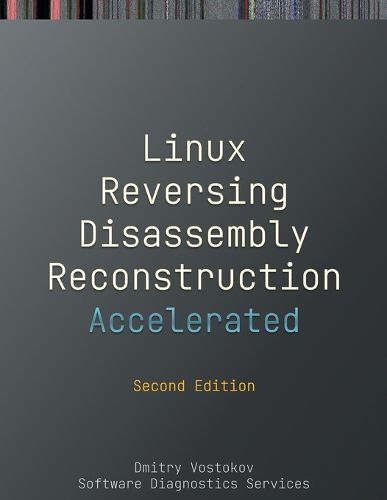Readings Newsletter
Become a Readings Member to make your shopping experience even easier.
Sign in or sign up for free!
You’re not far away from qualifying for FREE standard shipping within Australia
You’ve qualified for FREE standard shipping within Australia
The cart is loading…






This title is printed to order. This book may have been self-published. If so, we cannot guarantee the quality of the content. In the main most books will have gone through the editing process however some may not. We therefore suggest that you be aware of this before ordering this book. If in doubt check either the author or publisher’s details as we are unable to accept any returns unless they are faulty. Please contact us if you have any questions.
The book contains the full transcript of Software Diagnostics Services training. Learn disassembly, execution history reconstruction, and binary reversing techniques for better software diagnostics, troubleshooting, debugging, memory forensics, vulnerability, and malware analysis on x64 (x86_64) and A64 (ARM64, AArch64) Linux platforms. The course uses a unique and innovative pattern language approach to speed up the learning curve. The training consists of practical step-by-step, hands-on exercises using GDB and Linux core memory dumps. Covered more than 25 ADDR patterns originally introduced for the x64 Windows platform, and many concepts are illustrated with Memory Cell Diagrams. The prerequisites for this training are a working knowledge of C and C++ programming languages. Operating system internals and assembly language concepts are explained when necessary. The primary audience for this training is software technical support and escalation engineers who analyze memory dumps from complex software environments and need to go deeper in their analysis of abnormal software structure and behavior. The course is also useful for software engineers, quality assurance, and software maintenance engineers who debug software running on diverse cloud and endpoint computer environments, SRE and DevSecOps, security and vulnerability researchers, and malware and memory forensics analysts who have never used GDB for analysis of computer memory. The book also features ADDR pattern descriptions summarized after each exercise. The second edition includes a review of relevant assembly language fundamentals and relevant differences between GCC and Clang.
$9.00 standard shipping within Australia
FREE standard shipping within Australia for orders over $100.00
Express & International shipping calculated at checkout
Stock availability can be subject to change without notice. We recommend calling the shop or contacting our online team to check availability of low stock items. Please see our Shopping Online page for more details.
This title is printed to order. This book may have been self-published. If so, we cannot guarantee the quality of the content. In the main most books will have gone through the editing process however some may not. We therefore suggest that you be aware of this before ordering this book. If in doubt check either the author or publisher’s details as we are unable to accept any returns unless they are faulty. Please contact us if you have any questions.
The book contains the full transcript of Software Diagnostics Services training. Learn disassembly, execution history reconstruction, and binary reversing techniques for better software diagnostics, troubleshooting, debugging, memory forensics, vulnerability, and malware analysis on x64 (x86_64) and A64 (ARM64, AArch64) Linux platforms. The course uses a unique and innovative pattern language approach to speed up the learning curve. The training consists of practical step-by-step, hands-on exercises using GDB and Linux core memory dumps. Covered more than 25 ADDR patterns originally introduced for the x64 Windows platform, and many concepts are illustrated with Memory Cell Diagrams. The prerequisites for this training are a working knowledge of C and C++ programming languages. Operating system internals and assembly language concepts are explained when necessary. The primary audience for this training is software technical support and escalation engineers who analyze memory dumps from complex software environments and need to go deeper in their analysis of abnormal software structure and behavior. The course is also useful for software engineers, quality assurance, and software maintenance engineers who debug software running on diverse cloud and endpoint computer environments, SRE and DevSecOps, security and vulnerability researchers, and malware and memory forensics analysts who have never used GDB for analysis of computer memory. The book also features ADDR pattern descriptions summarized after each exercise. The second edition includes a review of relevant assembly language fundamentals and relevant differences between GCC and Clang.